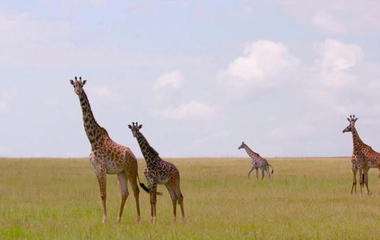Over the closing half-billion years, scientists say there were 5 mass extinction activities on the earth during which a large variety of species on this planet abruptly died off. Now, there's turning out to be proof that a sixth mass extinction is unfolding, in line with scientists who song species around the globe. In a brand new study, researchers say the present mass extinction is even "extra severe than perceived" and quantities to "biological annihilation" affecting thousands of species.
within the analyze, published Monday within the journal proceedings of the national Academy of Sciences, researchers from Stanford tuition and the country wide self reliant school of Mexico unveiled a granular examine population developments amongst 27,600 species of birds, amphibians, mammals, and reptiles — half of the world's commonplace terrestrial vertebrates — including special evaluation of 177 species of mammals.
The results are grim: researchers found an "extraordinarily high diploma of population decay" amongst vertebrates, even in species regarded at low chance of extinction. In widespread, they found that the realm's temperate regions are dropping species at equal and even bigger quotes than the tropics.
"Earth is experiencing a big episode of population declines and extirpations" — when a species ceases to exist in a selected region — "in order to have negative cascading penalties on ecosystem functioning and features essential to sustaining civilization," the researchers wrote.
"We describe this as a 'organic annihilation' to spotlight the present magnitude of Earth's ongoing sixth major extinction experience."
Pushed to the brinkDividing the realm's land hundreds right into a grid of 22,000 sections measuring 10,000-rectangular-kilometers (about 3,860 square miles) each and every, the researchers tracked species declines and painted a stark photo of populations being pushed to their limits.
for instance: lions have traditionally occupied roughly 2,000 of the 10,000-square-kilometer cells across several continents, however now occupy little more than 600 cells in sub-Saharan Africa and India. In south and southeast Asia, all of the massive-bodied mammals analyzed have lost more than eighty percent of their geographic levels.
searching through the lens of local populations extinctions (the precursor to irreversible species extinctions), the researchers conclude that "Earth's sixth mass extinction episode has proceeded additional than most anticipate."

Play Video
CBSN Giraffes brought to endangered species watch checklistAfter the giraffe population shrank almost forty % in just 30 years, conservationists have introduced giraffes to a watch record of threatened and en...
Senior conservation scientist Robin Naidoo of the area natural world Fund said the look at "makes a point it's every so often ignored" by means of targeting the lengthy, complex direction that precedes species extinction, from declining populations to decreasing range. despite the fact that or not it's far from extinction, a species in decline can cause "cascading outcomes on vegetation and habitat" in ecological networks that rely upon balance between animals, plants and microorganisms, Naidoo advised CBS information.
Conservation groups like the international Union for Conservation of Nature categorize species across the spectrum of extinction risk, from "least challenge," to "near threatened," "inclined," "endangered," "seriously endangered," "extinct within the wild," and eventually "extinct."
"This paper makes the element that it's now not basically extinction — it be about declines in populations. A species would not have to go extinct for a variety of bad results to be felt," Naidoo said.

These bad effects can without delay affect humans in many techniques. In fishing communities, fish so scarce they're considered "commercially extinct" can destroy native economies. In Africa, elephant declines as a result of poaching cost local economies $25 million per year in lost tourism profits, in line with a contemporary examine from the realm flora and fauna Fund.
people are guiltyEarth's outdated mass extinctions were frequently linked to sudden, cataclysmic herbal pursuits: abrupt alterations in climate, huge volcanic eruptions, enormous meteor strikes (like the one that worn out the dinosaurs about 66 million years in the past).
The latest mass extinction stands aside since it's largely brought about by means of humans, researchers say. From pollution to deforestation, overpopulation, poaching, warming oceans, and intense climate events tied to international warming, human undertaking is the fundamental gasoline behind this new period of irreversible species loss.

Play Video
CBS night information Thailand's "elephant whisperer" dedicated to saving endangered speciesThere are currently fewer than three,000 elephants living in the forests of Thailand, compared to four,000 in captivity. Sangduen "Lek" Chailert is comm...
people are leaving the world "a plenty, lots poorer region," Elizabeth Kolbert, author of "The Sixth Extinction" and a personnel writer for the brand new Yorker, informed CBS information. In her Pulitzer Prize-winning ebook, Kolbert argues that depleting the planet's biodiversity looks likely to be humankind's most lasting legacy.
though periodic extinctions have lengthy played a task in lifestyles in the world, the existing scope and cost of extinctions is anything but ordinary. The Earth has misplaced 200 species of vertebrates during the past 100 years alone, the researchers in the back of the brand new study referred to. If the traits of the previous two million years had held up, those losses may still have unfolded steadily over 10,000 years as opposed to a single century.
"An extinction should still be whatever that is very bizarre," Kolbert spoke of. "should you can establish loads of species which have gone extinct or are on the verge of extinction, it truly is definitely a extremely bizarre time in the Earth's history and a very unhealthy one."
This constant stream of species loss, about two extinctions per 12 months, hardly ever makes a blip on the general public's radar. in lots of situations, it truly is since the losses are obscure: contemporary extinctions consist of Mexico's Catarina pupfish or the Christmas Island pipistrelle bat, hardly ever family names.
reviews about these particular person extinctions frequently fail to deliver the magnitude and urgency of the bigger context: that for only the sixth time in history of the planet, the Earth's biodiversity looks to be coming apart at the seams.
"I really do suppose — and this study underscores that — that this is the large difficulty of our time," Kolbert talked about. "I suggest actually presently and for the subsequent many, many centuries, a long time, possibly millennia."
© 2017 CBS Interactive Inc. All Rights Reserved.



No comments: